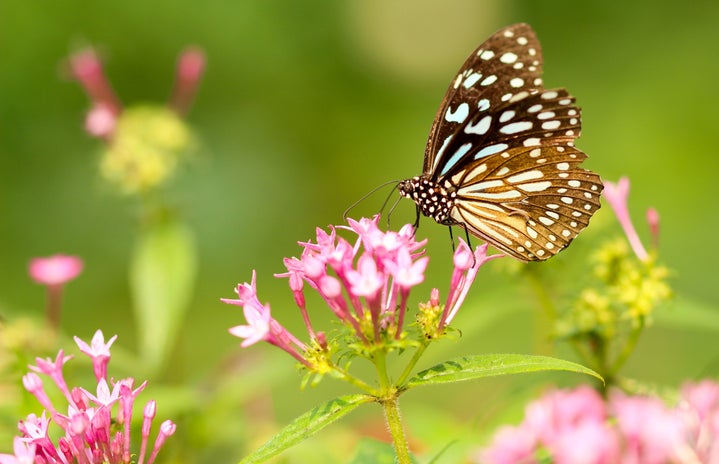Spring is an odd season. It’s beautiful, but torturous: it slaps you in the face with pollen everywhere and a tsunami wave of homework, and then gently brushes your cheek with the beauty of blooming cherry blossoms and baby bunnies. These albums won’t remedy your allergies, but they just might soothe your psyche as we count the waxing hours of sunlight until summer.
Dirty Computer (2018) // Janelle Monae
“It’s like I’m powerful / with a little bit of tender.”
At the time of writing this, I can only judge this album from the three currently-released singles: “Make Me Feel”, “Django Jane”, and “PYNK (ft. Grimes)”.
If you’ve been living under a rock — or are just heterosexual — and haven’t seen the music video for “Make Me Feel” yet, get on that, because it is a truly transcendental (NSFW) experience. “Make Me Feel”, with its tongue-clicking, cherry-popping rhythm, will pull you straight into a time-warped 1970s apartment with its imagery of “laying your body on the shag carpet,” but if that wasn’t alluring enough, rumor has it that the song’s signature sternum-rattling synth chords were composed by none other than Prince. Seriously.
“Django Jane,” too, begins with a silky synth line befitting your haziest summer dreams, but Janelle’s voice and lyrics cut through with no mincing of words: This is a triumphant anthem of both African-American history and modernity. Monae name-drops so much pop culture it’s nearly hard to keep up: Moonlight, Black Girl Magic, Scandal, doing it for the culture. “Prolly give a Tony to the homies / prolly get a Emmy dedicated to the highly melanated,” she predicts. This song is also unmistakably feminist, with lines like “We fem the future,” “hit the mute button / let the vagina have a monologue,” and “Mansplaining, I fold ‘em like origami.” I hope this song gets the attention it deserves alongside the rest of the album.
“PYNK”, featuring my high school sweetheart Grimes, is understated musically. As with “Make Me Feel,” the music video is where the concept fully unfurls.
The concept is vaginas.
Vagina pants, specifically. I saw the tweets about it before I saw the video, and I was just kind of like, oh okay, vagina art, cool, but nothing special. But then I actually watched the video. And watched it again. And a third time. It’s kind of perfect.
I think what keeps it from being some typical trans-exclusive essentialist BS is that it’s so specifically about queer women of color. If it were a straight white woman dancing around in vagina pants, I really wouldn’t care because that narrative has been done over and over. It’s the queerness and Blackness that matters and makes it beautiful.
I don’t know that I have anything more to say about it that hasn’t already been said, you really just have to experience it for yourself.
In conclusion, #20GAYTEEN is thriving.
Bury Me at Makeout Creek (2014) // Mitski
“Wild women don’t get the blues, but I find that / lately I’ve been crying like a tall child.”
Have you ever been walking outside at dusk and the streetlights are just turning on and the breeze is warm and it smells like flowers and you don’t even realize you’re crying until your cheeks are already wet? Gosh, do I have the album for you. First of all, it’s named after a Simpsons line, which is just excellent, and the songs are so poetic and heartfelt and it’s sort of like Milk and Honey if Rupi Kaur, um, cared about language.
The guitar is definitely grunge-inspired and Mitski’s voice is undulant, but the music still manages to be touching in a surprising and lovely way. One track is fittingly titled “First Love / Late Spring,” where the speaker attempts to protect her emotions by wishing that her lover would abandon her. “Francis Forever” depicts the raw emotion of being suddenly separated from a lover or a friend, including the particular, inexplicable sadness of light filtering through trees. “I Will,” over a buzzing bassline, is a reassurance from the speaker as they care for a loved one unable to care for themselves — “All the quiet nights you bear / seal them up with care / no one needs to know they’re there / for I will hold them for you.”
So, if you’ve recently experienced any form of heartbreak or loss, get ready to feel incredibly seen by these songs. But also, please take care of yourself.
How to Socialise & Make Friends (2018) // Camp Cope
“Now I’m turning onto your street / Now I love you like you never hurt me.”
I fell in love with Georgia Maq’s voice first. Her beautiful Australian accent makes her bold singing voice all the more interesting to my boring American self. Although Camp Cope is comprised of three young women, singer Georgia “Maq” Mcdonald, bassist Kelly-Dawn “Kel” Hellmrich, and drummer Sarah “Thomo” Thompson, they are anything but a “girl band,” and although their style and aesthetic seems bedroom-indie, local even, they sold out the Sydney Opera House two nights in a row on their last tour. They’ve been in the music news lately, criticizing festivals for booking low amounts of female performers. The first song on How to Socialise & Make Friends is titled “The Opener”, a double entendre for an opening band and the opening track of the album, and continues to criticize the disrespect of female musicians. “Treat them like queens until they disagree,” Maq derides, “and never reflect to think ‘wait, maybe the problem was me.’” Georgia Maq does not mince her words: “It’s another all-male tour preaching equality / It’s another straight cis man who knows more about this than me.”
In a tweet, Maq stated that this album was not for cis white men, and that they should not review it:
can cis white men stop reviewing our album. it’s not for you.
— goldsoundz_ (@GeorgiaMaq) February 28, 2018
i would MUCH rather a woman or a queer person write the review, i’d MUCH rather that person get exposure and get paid for their writing. they deserve it more.
— goldsoundz_ (@GeorgiaMaq) February 28, 2018
As a queer woman writing this review, I really appreciate that.
One of the most important tracks on this album is “The Face of God,” on surviving sexual assault. The all-too-familiar lines of denial from the survivor and others surrounding her — “Could it be true? / You don’t seem like that kind of guy. Not you / You’ve got that one song that I like” — cut through the feelings of hurt, guilt, anger, and confusion that accompany an assault. Isolation plagues Maq to the point that she feels even “the face of God” is turning away from her, “that somehow it was my fault.” Reviewers of this album are often quick to lump this song into the recent wave of survivors who have declared #MeToo, but that seems like demoting the song to a bandwagon topic when it is so much more than just a hashtag. It took an incredible amount of courage for Georgia Maq to write, record, and include this song on the album. I hope it makes other survivors of sexual assault, especially in the music scene, feel less alone.
But wait, I hear you saying, where’s Cardi?! Good news: our Co-Editor-in-Chief Mearesea already secured that. Check out her review of Invasion of Privacy here. Get money, go hard, et cetera.


